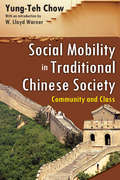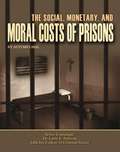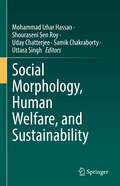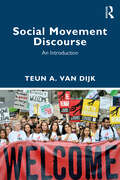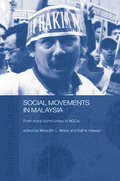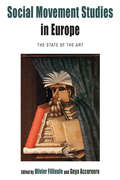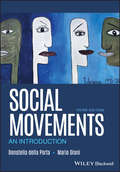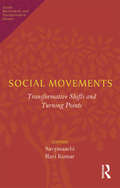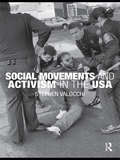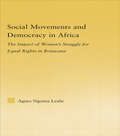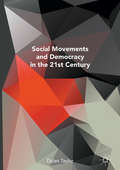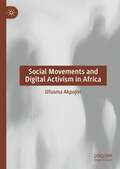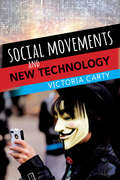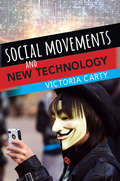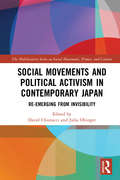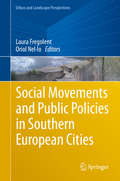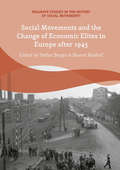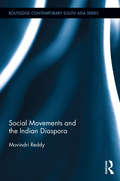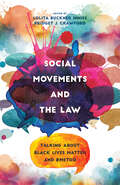- Table View
- List View
Social Mobility in Traditional Chinese Society: Community and Class
by Yung-Teh ChowThis authoritative volume - a large-scale empirical work comparable to Pitirim Sorokin's Social Mobility - is a penetrating and comprehensive study of social stratification and mobility in traditional Chinese society and a highly significant addition to the theoretical and factual foundations of contemporary social science. It offers an authentic portrayal not only of social mobility but of social life in China in general at the time of its original publication in the 1960s.It includes the life histories of the upper class - scholars, active and retired officials, merchants, and wealthy landlords - and an analysis of social statistics drawn from one Chinese county, which provides new interpretations of the processes of social mobility, the relationship of this class to society as a whole, and the motives of upwardly mobile individuals. Each life history comprises at least five generations and its resulting accounts touch upon the lives of 1,200 persons, and help place the development of the gentry in illuminating context within the population as a whole.Chow's book offers a welcome method of comparison of two societies that have both birth and mobile elites. As China entered the world system, its open class system changed from fluidity to disorganization regarding its character. As such it was transformed into an innovating society in which the earlier system could not, or did not, work. Social Mobility in Traditional Chinese Society is unique in its field for the successful correlation of conceptual framework with its detailed wealth of empirical findings. It will be welcomed by all students of social science, international relations, and Asian studies.
Social Mobilization in the Arab/Israeli War of 1948: On the Israeli Home Front (Israeli History, Politics and Society)
by Moshe NaorIn many ways, the Arab-Israeli war of 1948 is typical of the total military conflicts that characterized the first half of the twentieth century. However, in addition to the military course of the war, and its formative and revolutionary ramifications, this war was also notable for the social mobilization of the Israeli population. Social Mobilization in the Arab-Israeli War of 1948 focuses on these civilian aspects of the war, the involvement of the Israeli home front in the fighting and the participation of society in the process of mobilization. Israeli civil society organizations played an active and central role in mobilizing the economy for the war effort, mobilizing personnel for military service, for labor and for the emergency services, and in organizing the home front. The function of Israeli society and civil organizations in processes of mobilization, conducted against the background of the end of the British mandate and the establishment of the State of Israel, was one of the principal factors that contributed to the Israeli military victory in the 1948 war. Civilian aspects of the 1948 war have received little attention, despite the opening of the archives in the 1980s. As such, Social Mobilization in the Arab-Israeli War of 1948 is an important contribution, particularly for those interested in Israeli History, Jewish History, Middle Eastern History, the Arab-Israeli conflict and War Studies.
The Social, Monetary, And Moral Costs of Prisons
by Autumn LibalThe incarceration system plays important punitive, rehabilitative, and protective roles in North American society. But despite its indispensable nature, the incarceration system is fraught with complications and problems. This book teaches readers about the complex social, economic, and moral costs that are inevitably associated with the placement of human beings behind bars.
Social Morphology, Human Welfare, and Sustainability
by Mohammad Izhar Hassan Shouraseni Sen Roy Uday Chatterjee Samik Chakraborty Uttara SinghThis volume discusses a broad range of human welfare problems associated with and stemming from social issues, natural resource deficiencies, environmental hazards, vulnerability to climate change, and sustainability challenges. The chapters form a framework centered around the concept of social morphology, i.e. the role of humans in shaping society, and associated human-nature interactions which inform the ability to achieve sustainable welfare and well-being. The book is divided in six sections. Section I contains the introductory chapters where the book explores shifting interfaces between environment, society, and sustainability outcomes. Section II discusses contemporary issues of social welfare, and covers sustainable approaches in geo-heritage and ecotourism. Section III addresses the roots of various social conflicts and inequalities in relation to overpopulation, poverty, illiteracy, employment concerns, and human migration. Section IV highlights social security and areas of social deprivation, including urban affordability, gender equality, and women’s health. Section V covers social issues resulting from natural hazards and disasters. Section VI concludes the book with a discussion of the way forward for social sustainability. The book will be of interest to students, researchers, policy makers, environmentalists, NGOs, and social scientists.
Social Movement Campaigns on EU Policy (International Political Economy Series)
by Louisa ParksThis book investigates if and how social movement campaigns influence European policy, a particularly pertinent question in today's political climate of disillusionment with Europe in many member states. Using a range of campaigns launched by social movement organisations, from genetically modified organisms and Internet freedom to trade union rights and water rights, Parks elucidates the important differences between technical and political campaigns. Technical campaigns are characterised by extended engagement with consultation mechanisms and the production of expert information, particularly for the European Commission. In political campaigns, social movement organisations target the EU at national and local levels, using strategies reminiscent of social movements as they are more commonly known. A comparison of the campaigns suggests that targeting member state governments with protest and harnessing public opinion is central to securing influence over EU policy, and that where national and local levels are made integral to efforts in shaping European policy, influence is more likely.
Social Movement Discourse: An Introduction
by Teun A. van DijkThis is both the first systematic introduction to Discourse Studies for students and scholars of social movements and a study of discourses on the European "refugee crisis", by leading theorist, Teun A. van Dijk. Concrete examples of different kinds of discourse are vital for the study of social movements because their activities are not limited to such well-known forms of contention as marches, occupations or strikes, but also daily discursive activities, such as meetings, assemblies, interviews, press conferences, manifestos, pamphlets, banners, graffiti, websites, blogs, social media posts and everyday talk. This book proposes that empirical analyses of these discourses should go beyond the popular but vague notion of "frame" and engage in more detailed and explicit analyses of the text and talk of social movements. This is a much-needed introduction to the most important structures of discourse and a detailed theoretical account of the notion of "solidarity" defining the Refugees Welcome movement.
Social Movement Discourse: An Introduction
by Teun A. van DijkThis is both the first systematic introduction to Discourse Studies for students and scholars of social movements and a study of discourses on the European “refugee crisis”, by leading theorist, Teun A. van Dijk.Concrete examples of different kinds of discourse are vital for the study of social movements because their activities are not limited to such well-known forms of contention as marches, occupations or strikes, but also daily discursive activities, such as meetings, assemblies, interviews, press conferences, manifestos, pamphlets, banners, graffiti, websites, blogs, social media posts and everyday talk.This book proposes that empirical analyses of these discourses should go beyond the popular but vague notion of “frame”and engage in more detailed and explicit analyses of the text and talk of social movements.This is a much-needed introduction to the most important structures of discourse and a detailed theoretical account of the notion of “solidarity” defining the Refugees Welcome movement.
Social Movement Malaysia: From Moral Communities To Ngos
by Meredith L. Weiss Saliha HassanThis book considers the proliferation in Malaysia over the past two decades of non-governmental organizations (NGOs) associated with various social movements, both to provide basic information about the NGOs and social movements, and to discuss their role in the development of civil society generally in particular their contribution to the reform movement, which has been gathering strength since 1998. The book discusses the nature and development of the movements, and shows that those movements concerned with human rights and women's issues have made significant contributions to the reform movement and been irrevocably changed by their involvement in it.
Social Movement Studies in Europe: The State of the Art
by Olivier Fillieule Guya AccorneroBringing together over forty established and emerging scholars, this landmark volume is the first to comprehensively examine the evolution and current practice of social movement studies in a specifically European context. While its first half offers comparative approaches to an array of significant issues and movements, its second half assembles focused national studies that include most major European states. Throughout, these contributions are guided by a shared set of historical and social-scientific questions with a particular emphasis on political sociology, thus offering a bold and uncommonly unified survey that will be essential for scholars and students of European social movements.
Social Movements: An Introduction (Comparative Politics Ser.)
by Donatella della Porta Mario DianiA new, fully-revised and updated edition of the leading introduction to social movements and collective action – covers a broad range of approaches in the social sciences. Now in its third edition, Social Movements is the market-leading introductory text on collective action in contemporary society. The text draws from theory-driven, systematic empirical research from across the social sciences to address central questions and concepts in the field. Sophisticated yet reader-friendly chapters offer critical analyses of relevant literature whilst exploring important issues and debates. The global political landscape has undergone significant changes in the years since this book’s initial publication, such as the spread of online protests, the resurgence of nationalist and right-wing activity, global revolts, and increased social and economic polarization. This thoroughly updated edition offers fresh discussions of recent social movements against austerity from around the world, new empirical examples, references to recent episodes of contention, an expanded comparative approach to social movement theory in the scientific literature, and more. Positioned at the intersection of sociology and political science, this book: Presents an empirical and engaging exploration of contemporary social movements Discusses topics such as organizing within social movements, eventful protests, political opportunities, symbolism and identity in collective action, and social change Highlights how core mechanisms of collective action operate in different movements, past and present Provides a conceptual methodology useful for social science students and researchers alike Highlights how core mechanisms of collective action operate in different movements in the past and present Written by two internationally recognized experts in sociology and political science, the third edition of Social Movements: An Introduction is an essential course text and a must-read for students and scholars of sociology, political sociology, political science, and social movement studies.
Social Movements: Transformative Shifts and Turning Points (Social Movements and Transformative Dissent)
by Savyasaachi Ravi KumarThis volume attempts to show the emerging contours of ‘transformative action’ in social movements across South Asia. It argues that these contours have been shaped by contestations over questions of equity, justice and well-being on the one hand, and the nature and scope of new and classical social movements on the other. This is manifest in diverse modes through people’s struggles, protest and dissent. The authors examine a variety of themes that have determined the course of the politics of transformative struggles. They critique neoliberalism, ‘primitive’ accumulation, money, class inequalities, as well as aspects of capital–labour conflict. They highlight the contributions of movements by women, dalit and marginalized communities; peace movements; and environmental and agrarian struggles. The volume also appraises the role of internet in grassroots mobilizations and that of civil society networks in the making of participatory democracy. It further argues that the predicaments of cultural, ethnic, national, regional, and linguistic identities are not divorced from capital–labour conflicts. The book will serve as essential reading for students and scholars of sociology, social movements, politics, gender and feminist studies, labour studies, and the informed general reader.
Social Movements and Activism in the USA
by Stephen ValocchiWhat can we learn when we listen closely to and engage in dialogue with social movement activists? Social Movements and Activism in the USA addresses this question for a group of progressive activists in Hartford, Connecticut, who do community, labor, feminist, gay and lesbian, peace, and anti-racist organizing. Situated within the twenty-first-century landscape of post-industrialism and neo-liberalism and drawing on oral histories, the book argues for a dialogic and integrative approach to social movement activism. The dialogue between scholar and activist captures the interpretive nature of activists' identity, the variable ways activists decide on strategies and goals, the external constraints on activism, and the creative ways activists manoeuvre around these constraints. This dialogic approach makes the book accessible and useful to students, scholars, and activists alike. The integrative nature of the text refers to its theoretical approach. Rather than advancing a new theory of social movements, it uses existing approaches as a tool kit to examine the what, how, who, and why of social movement activism.
Social Movements and Democracy in Africa: The Impact of Women's Struggles for Equal Rights in Botswana (African Studies)
by Agnes Ngoma LeslieThis book examines social movements in Africa, analyzing how they emerge and how they may impact public policy, the legal and political situation, and the society by focusing on the following question: How do women's political and legal rights get extended and institutionalized in a patriarchal democratic society?
Social Movements and Democracy in the 21st Century
by Dylan TaylorThis book contends that the impasse of the Left today is in part, a result of an anarchist 'common sense' among activists. The author argues that the vital dynamics of anarchism and social movements need to be combined with a reappraisal of the Communist party and state. While cynicism towards capitalism and existing political institutions is plentiful, this book argues that the Left appears mired in a reactive politics of resistance, unable to formulate programmes for substantive social change. Drawing insights from the history of the Left, political economy, contemporary critical theory and an in-depth study of Occupy, the author provides concrete suggestions as to how the Left might 'claim the twenty-first century' and realise a more equitable social order. Social Movements and Democracy in the 21st Century challenges activists and scholars to rethink social movements and political organisation, and to actively work towards enduring social change. The book will be of interest to students and scholars of social movement studies, Left theory, critical theory, political sociology and Marxism, as well as anyone with an interest in 'political change'.
Social Movements and Digital Activism in Africa
by Ufuoma AkpojiviThis book analyses social movements, digital activism and protest actions in Africa using a de-colonial approach, with selected case studies of #BringBackOurGirls, #OurMumuDonDo, #FeesMustFall, and #OccupyGhana from Nigeria, South Africa and Ghana. This book examines the ideological background of social movements and the broader micro/macro structures that exist within these movements and how these structures shape their engagement with state and non-state actorsThe author argues that the ideological orientation of movement founders influenced the broader belief of each movement, which in turn shaped the micro and macro structure and relationships of the movements and their engagement with the state. Furthermore, the author argues that not all movement members aligned with the movement's ideological belief, thus the disconnect and contestation within these movements. This book provides much-needed systematic, critical review and cutting-edge research into the ideology, practices, performance, and trends of social and digital movements in Sub-Saharan African countries.
Social Movements and New Technology
by Victoria CartyThe emergence of new information communication technologies--such as the Internet and social media networking sites and platforms--has strongly affected social movement activism. In this compelling and timely book, Victoria Carty examines these movements and their uses of digital technologies within the context of social movement theory and history. With an accessible and unique mix of theory and real-world examples, Social Movements and New Technology takes readers on a tour through MoveOn and Tea Party e-mail campaigns, the hacktavist tactics of Anonymous, global online protests against rapists and rape culture, and the tweets and Facebook pages that accompanied uprisings across the Arab world, Europe, and the United States. In each case study, the reader is invited to examine the movement, organization or protest and their use of digital tools through the lens of social movement theory. Discussion questions at the end of each chapter invite critical thinking and further reflection and debate.
Social Movements and New Technology
by Victoria CartyThe emergence of new information communication technologies-such as the Internet and social media networking sites and platforms-has strongly affected social movement activism. In this compelling and timely book, Victoria Carty examines these movements and their uses of digital technologies within the context of social movement theory and history. With an accessible and unique mix of theory and real-world examples, Social Movements and New Technology takes readers on a tour through MoveOn and Tea Party e-mail campaigns, the hacktavist tactics of Anonymous, global online protests against rapists and rape culture, and the tweets and Facebook pages that accompanied uprisings across the Arab world, Europe, and the United States. In each case study, the reader is invited to examine the movement, organization or protest and their use of digital tools through the lens of social movement theory. Discussion questions at the end of each chapter invite critical thinking and further reflection and debate.
Social Movements and New Technology: Social Movements, New Technology, And Electoral Politics (Routledge Studies In Science Technology And Society Ser.)
by Victoria CartyThe emergence of new communication technologies (such as the Internet and social media networking sites and platforms) has strongly affected social movement activism. In this compelling and timely book, Victoria Carty examines these movements and their uses of digital technologies within the context of social movement theory and history. With an accessible and unique mix of theory and real-world examples, Social Movements and New Technology takes readers on a tour through MoveOn and Tea Party e-mail campaigns, the hacktivist tactics of Anonymous, global online protests against rapists and rape culture, and the tweets and Facebook pages that accompanied uprisings across the Arab world, Europe, and the United States. In each case study, the reader is invited to examine the movement, organization, or protest and their use of digital tools through the lens of social movement theory. Discussion questions at the end of each chapter invite critical thinking, further reflection, and debate.
Social Movements and Political Activism in Contemporary Japan: Re-emerging from Invisibility (The Mobilization Series on Social Movements, Protest, and Culture)
by David Chiavacci Julia ObingerThis book explores social movements and political activism in contemporary Japan, arguing that the 2011 Fukushima nuclear accident marks a decisive moment, which has led to an unprecedented resurgence in social and protest movements and inaugurated a new era of civic engagement. Offering fresh perspectives on both older and more current forms of activism in Japan, together with studies of specific movements that developed after Fukushima, this volume tackles questions of emerging and persistent structural challenges that activists face in contemporary Japan. With attention to the question of where the new sense of contention in Japan has emerged from and how the newly developing movements have been shaped by the neo-conservative policies of the Japanese government, the authors ask how the Japanese experience adds to our understanding of how social movements work, and whether it might challenge prevailing theoretical frameworks.
Social Movements and Protest
by Gemma EdwardsThis lively textbook integrates theory and methodology into the study of social movements, and includes contemporary case studies to engage students and encourage them to apply theories critically. A wide range of protest cases are explored, from American, European and global arenas, including contemporary examples of political violence and terrorism, alter-globalisation, social networking and global activism. Key chapter features encourage students to engage critically with the material: method points uncover the methodology behind the theories, helping students to understand the larger study of social movements; debate points highlight classic arguments in social movement studies, encouraging students to critically assess theoretical approaches; and case studies connect theories to cases, allowing students to relate key principles to real-world examples. A companion website offers additional student and instructor resources, including lecture slides and worksheets.
Social Movements and Public Policies in Southern European Cities (Urban and Landscape Perspectives #21)
by Laura Fregolent Oriol Nel·loThe book analyzes the impact of urban movements on government and public policies in a context of rapid urban transformations, public policy crises and increasing social inequalities. The essays show how the impact of the movements is increasing and has effects both in the orientation of the policies, as in their form of management and its effects. The authors are leading scholars from universities and research centers in Spain, Italy, Portugal, France, Germany and the United Kingdom.
Social Movements and Sexual Citizenship in Southern Europe
by Ana Cristina SantosThis book explores the relationship between social movements, sexual citizenship and change in Southern Europe. Providing a comparative analysis about LGBT issues in Italy, Spain and Portugal, it discusses how activism can generate legal, political and cultural impact in post-dictatorial, Catholic and EU-focused countries.
Social Movements and the Change of Economic Elites in Europe after 1945 (Palgrave Studies in the History of Social Movements)
by Stefan Berger Marcel BoldorfThis book explores the changing nature of social movements and economic elites in post-Second World War Europe. In the years following 1945, Europe faced diverse challenges connected by the overriding question of how the reconstruction of the continent should proceed. For the Central Powers, the implementation lay in the hands of the Allied occupying forces who organised the process of denazification and the establishment of a new economic order. In countries without military occupation, there was a deep gap between the new governmental forces and the former collaborators. In both cases, social movements which were formed by anti-fascists on the left of the political spectrum assumed the task of social reorganisation. The chapters in this book explore the discourses about economic systems and their elites which moved to the fore across a range of European countries, uncovering who was involved, what resistance these social movements faced and how these ultimately failed in the West to bring about change, while in Eastern Europe Stalinism forcibly imposed change.
Social Movements and the Indian Diaspora (Routledge Contemporary South Asia Series)
by Movindri ReddyWith the elevation of Islam and Muslim transnational networks in international affairs, from the rise of Al Qaeda to the revolutions in North Africa and the Middle East, the study of Diasporas and transnational identities has become more relevant. Using case studies from Fiji, Mauritius, Trinidad and South Africa, this book explores the diaspora identities and impact of social movements on politics and nationalism among indentured Indian diaspora. It analyses the way in which diasporas are defined by themselves and others, and the types of social movements they participate in, showing how these are critical indicators of the threat they are perceived to pose. The book examines the notions of national and transnational identity, and how they are determined by the placement of Diasporas in the transnational locality. It argues that the transnationality intrinsic to diaspora identities mark them as others in the nation-state, and simultaneously separates them from the perceived motherland, thus displacing them from both states and situating them in a transnational locality. It is from this placement that social movements among Diasporas gain salience. As outsiders and insiders, they are well placed to offer a formidable challenge to the host state, but these challenges are limited by their hybrid identities and perceived divided loyalties. Providing an in-depth analysis of Indian Diasporas, the book will be of interest to those studying South Asian Studies, Migration and Diaspora Studies.
Social Movements and the Law: Talking about Black Lives Matter and #MeToo
by Lolita Buckner Inniss and Bridget J. CrawfordBlack Lives Matter and #MeToo are two of the most prominent twenty-first-century social movements in the United States. On the ground and on social media, more people have taken an active stance in support of either or both movements than almost any others in the country's history. Social Movements and the Law brings together the voices of twelve scholars and public intellectuals to explore how Black Lives Matter and #MeToo unfolded—separately and together—and how they enrich, inform, and complicate each other. Structured in dialogues and punctuated with informative text boxes, illustrations, and discussion questions, this accessible guide to an increasingly influential area of the law centers rich intersectional analysis of both movements and prompts readers to undertake further reflection and conversation. At a time of heightened public attention to the broader implications of human social behavior and interaction, this book shows rather than tells how people with different perspectives can engage one another with open minds and generosity of spirit.
